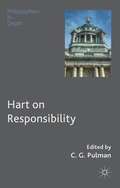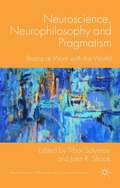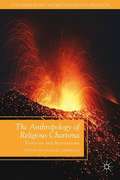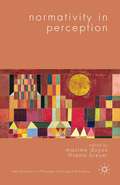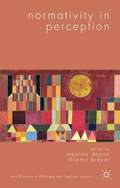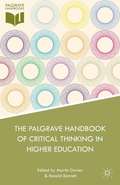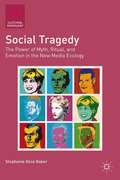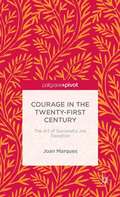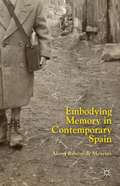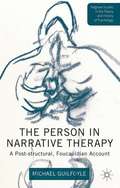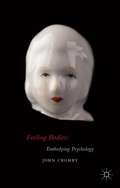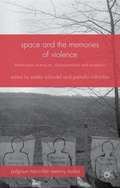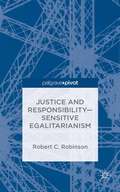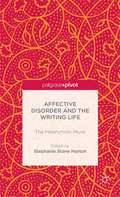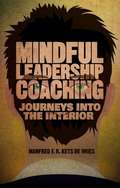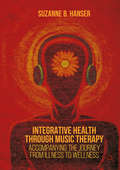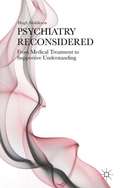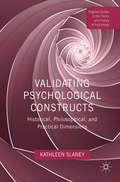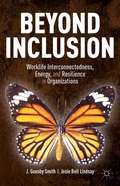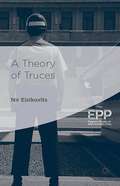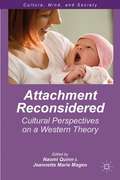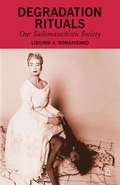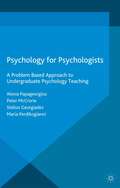- Table View
- List View
Hart On Responsibility
by Christopher PulmanA collection of essays discussing Herbert Hart's writings on responsibility. The essays focus upon Hart's work on causation in the law and on the justification of punishment. Specific topics discussed include senses of 'responsibility', voluntariness, Mill's harm principle, mens rea, excuses, the Hart-Wootton debate, and negligence.
Neuroscience, Neurophilosophy and Pragmatism
by John R. Shook Tibor SolymosiBringing together active neuroscientists, neurophilosophers, and scholars this volume considers the prospects of a neuroscientifically-informed pragmatism and a pragmatically-informed neuroscience on issues ranging from the nature of mental life to the implications of neuroscience for education and ethics.
The Anthropology Of Religious Charisma
by Charles LindholmAccording to Max Weber, charisma is opposed to bureaucratic order. This collection reveals the limits of that formula. The contributors show how charisma is a part of cultural frameworks while retaining its ecstatic character among American and Italian Catholics, Syrian Sufis, Taiwanese Buddhists, Hassidic Jews, and Amazonian shamans, among others.
International Political Psychology
by Anna Cornelia BeyerThis book intends to harvest insights from the discipline of Psychology, in its broad understanding, for application to International Relations. Although Psychology offers an abundance of theories that are useful for this purpose, they have so far remained largely untapped. In chapters on conflict, hegemony, terrorism, mental health, global consciousness, and peace proposals, Byer provides a synthesis of these two complimentary disciplines. This innovative volume presents the first contribution to the new discipline of International Political Psychology.
Normativity in Perception (New Directions in Philosophy and Cognitive Science)
by Thiemo Breyer Maxime DoyonThe ways in which human action and rationality are guided by norms are well documented in philosophy and neighboring disciplines. But how do norms shape the way we experience the world perceptually? The present volume explores this question and investigates the specific normativity inherent to perception.
Normativity in Perception (New Directions In Philosophy And Cognitive Science)
by Thiemo Breyer Maxime DoyonNormativity in Perception.
The Palgrave Handbook of Critical Thinking in Higher Education
by Martin Davies Ronald BarnettPalgrave Handbook of Critical Thinking in Higher Education explores critical thinking in higher education in all its forms, from definitions to teaching and incorporating it into the curriculum, its relationship to culture and the professions, and its social perspectives and scientific and cognitive manifestations. Davies and Barnett ask what is critical thinking, especially in the context of higher education? The handbook explores these questions, with contributors offering their insight into the contemporary understandings of higher education worldwide.
Social Tragedy
by Stephanie Alice BakerA social tragedy is a collective representation of injustice. Baker demonstrates how social tragedies facilitate moral action and discusses a series of contemporary case studies - the death of Princess Diana, Zin#65533;dine Zidane's 2006 World Cup scandal, KONY 2012 - to examine their social and political effects.
Courage in the Twenty-First Century: The Art of Successful Job Transition
by Joan MarquesCourage outlines the art of moving forward both in professional and personal life. Marques offers a strategy for self-renewal in order to divulge the virtues and viewpoints to successfully move from one career to another.
Embodying Memory In Contemporary Spain
by Alison Ribeiro de MenezesThis innovative book examines the emergence of a memory discourse in Spain since the millennium, taking as its point of departure recent grave exhumations and the "Law of Historical Memory. " Through an analysis of exhumation photography, novels, films, television, and comics, the volume overturns the notion that Spanish history is pathological.
The Person in Narrative Therapy
by Michael GuilfoyleThis book argues that narrative practice does not have a coherent formulation of personhood in the way one finds in other fields, such as psychoanalysis and cognitive-behavioural therapy. It examines the post-structural principles that underpin narrative practice, which make available powerful conceptual tools for theorizing the person.
Space and the Memories of Violence
by Estela Schindel Pamela ColomboAuthors from a variety of disciplines dealing with diverse historical cases engage with the spatial deployment of violence and the possibilities for memory and resistance in contexts of state sponsored violence, enforced disappearances and regimes of exception. Contributors include Aleida Assmann, Jay Winter and David Harvey.
Justice and Responsibility— Sensitive Egalitarianism
by Robert C. RobinsonThis text explores the place to locate the cut between those inequalities for which it is fair to hold one responsible, and those for which it is not. The argument traces a thread of intellectual history, identifying a rejection of strong property rights which we inherit from Locke, and find in contemporary defenders of entitlements such as Nozick.
Affective Disorder and the Writing Life: The Melancholic Muse
by Stephanie Stone HortonAffective Disorder and the Writing Life interrogates the mythos of the 'mad writer' through lived experience, literary analysis, writerly reflection and contemporary neuroscience. It explores how affective disorders colour, drive and sometimes silence the writing mind - and how affective difference has always informed the literary imagination.
International Intervention in Ethnic Conflict
by Etain TannamThe EU and the UN have become increasingly involved in conflict resolution, yet they are rarely compared systematically. This book focuses on the role of bureaucracies in the European Union (EU) and the United Nations (UN) when dealing with conflict. Tannam's comparative analysis of EU and UN policy-making procedures explores how and why they differ from each other, arguing that the UN Secretariat and the European Commission have autonomy under certain conditions and that reducing explanations of EU and UN policy outcomes to political will, or to the preferences of member states is inaccurate. This unique empirical study, enhanced by interviews with practitioners, will be a valuable resource for scholars of International Relations, Peace Studies and Comparative Politics.
Mindful Leadership Coaching
by Manfred F. R. Kets de VriesMindful Leadership Coaching takes an in-depth look at the coaching processes. The insights provided here will help coaches and executives to use frameworks for transforming attitudes, beliefs, and behaviors. It advises on how the best leadership coaches help their executive clients create significant personal and professional change.
Integrative Health through Music Therapy
by Suzanne B. HanserRecent music therapy advances and evidence-based practices have earned respect within the medical sciences and garnered popularity amongst users and practitioners. While integrative medicine treats the whole patient with ayurvedic and allopathic medicine, music therapy provides a safe and effective way of managing stress, pain, unpleasant symptoms, response to illness, and treatment side effects, and has been proven to enhance patients' quality of life and general wellbeing. Exploring the ways in which these methods have been practised throughout history, the author takes readers on a journey from illness to wellness, and shows how this can be guided through music. The book instructs music therapists and other practitioners in the use of specific techniques, providing examples of clinical applications. It includes activities that prepare a music therapist physically, emotionally and musically for this journey with another, and provides case studies to explore the difficulties that might arise.
Psychiatry Reconsidered
by Hugh MiddletonPsychiatry suffers a lot of criticism, not least from within its own scientifically founded medical world. This book provides an account of mental health difficulties and how they are generally addressed in conventional medical circles, alongside critical reviews of the assumptions underpinning them to encourage more humanitarian perspectives.
Validating Psychological Constructs
by Kathleen SlaneyThis book critically examines the historical and philosophical foundations of construct validity theory (CVT), and how these have and continue to inform and constrain the conceptualization of validity and its application in research. CVT has had an immense impact on how researchers in the behavioural sciences conceptualize and approach their subject matter. Yet, there is equivocation regarding the foundations of the CVT framework as well as ambiguities concerning the nature of the "constructs" that are its raison d'etre. The book is organized in terms of three major parts that speak, respectively, to the historical, philosophical, and pragmatic dimensions of CVT. The primary objective is to provide researchers and students with a critical lens through which a deeper understanding may be gained of both the utility and limitations of CVT and the validation practices to which it has given rise.
Beyond Inclusion
by J. Goosby Smith Josie Bell LindsayAfter infusing equity into organizational processes, conducting diversity training, and ensuring fair hiring practices, today's leaders have hit a brick wall. While they have diversified organizations, they realize that more needs to be done to make their organizations truly inclusive. Beyond Inclusion adopts a holistic and systems view of the organization and presents a robust model of how individuals and leaders experience inclusion in the workplace. Borrowing the African concept of Ubuntu, which assumes the connectedness and interdependence within a social system, the authors frame and make concrete the thoughts and actions that result in inclusive organizations. After presenting an actionable model of organizational inclusion based upon rigorous research with thousands of individual contributors and leaders in several countries including the U. S. , the authors discuss concrete strategies and leadership actions that create, nurture, and sustain workplace inclusion. Leaders will learn specific behaviors that energize themselves and their employees, resulting in more inclusive teams, departments, and organizational cultures.
A Theory of Truces (Palgrave Studies In Ethics And Public Policy)
by Nir EisikovitsA Theory of Truces.
Attachment Reconsidered
by Jeannette Marie Mageo Naomi QuinnSince the 1950s, the study of early attachment and separation has been dominated by a school of psychology that is Euro-American in its theoretical assumptions. Based on ethnographic studies in a range of locales, this book goes beyond prior efforts to critique attachment theory, providing a cross-cultural basis for understanding human development.
Degradation Rituals: Our Sadomasochistic Society
by Lisiunia A. RomanienkoA candid exploration of sadomasochistic practices driving contemporary culture, covering the demoralizing socioeconomic and political conditions that give rise to agonizing rituals of cruelty demonstrated at systemic, transnational, religious, familial, and even sexual spheres of human relations.
Psychology for Psychologists: A Problem Based Approach to Undergraduate Psychology Teaching
by Alexia Papageorgiou Peter McCrorie Stelios Georgiades Maria PerdikogianniThis book uses psychological theories and learning processes, such as Problem Based Learning (PBL), to provide a new approach for teaching psychology at an undergraduate level and prevent diminishing motivation. It creates a detailed example of a psychology degree using the PBL method and suggests how a week of the course could be planned.
